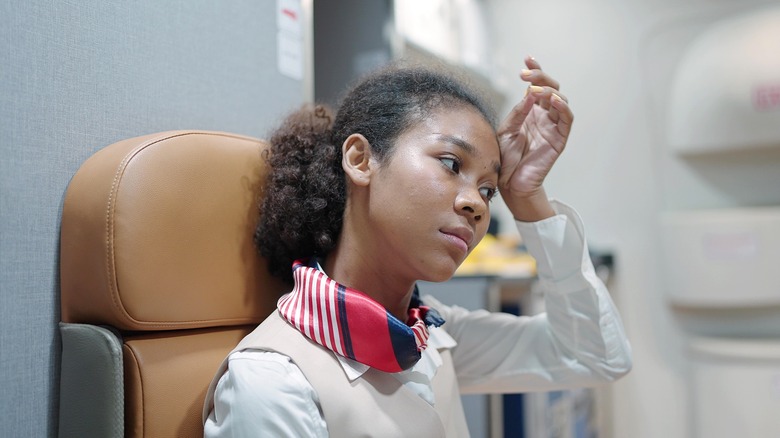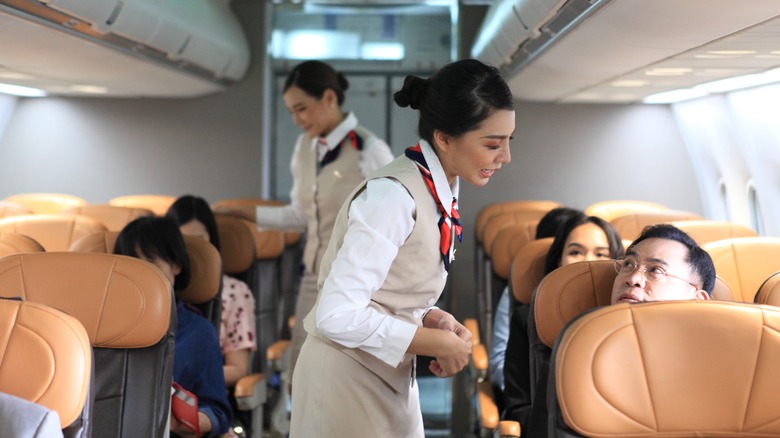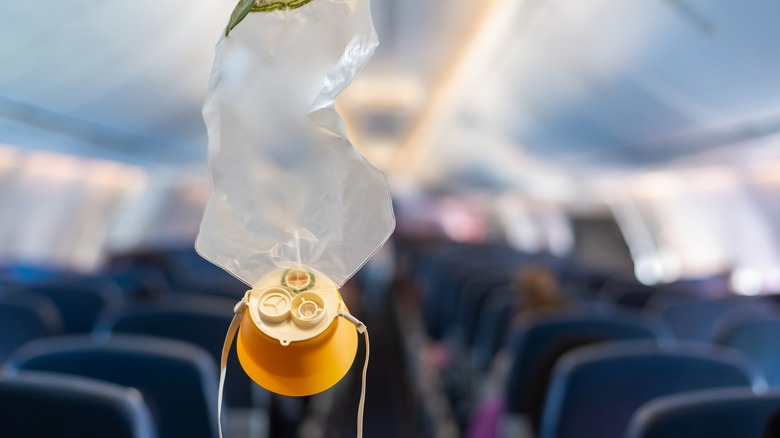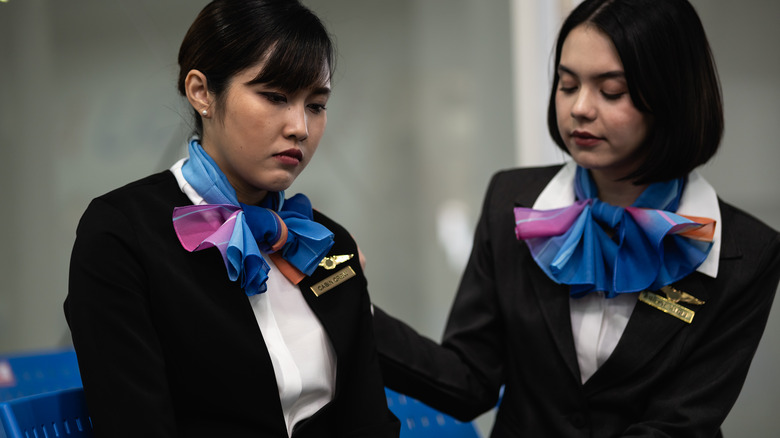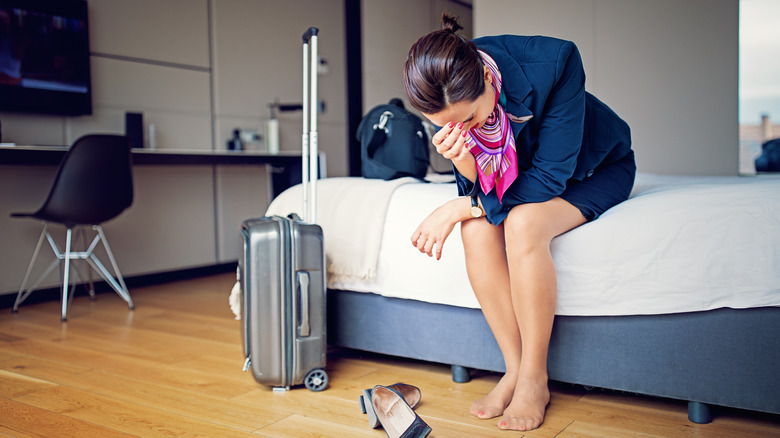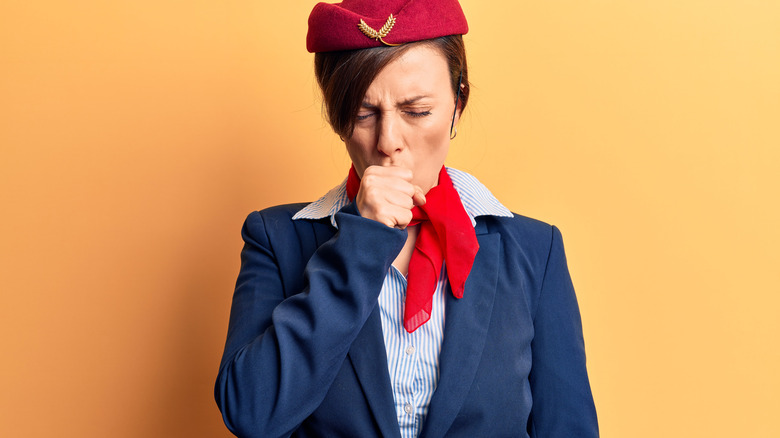Flight Attendants Reveal The Most Dreadful Parts Of Their Job
Contrary to what you might believe, being a flight attendant isn't all about jetting off to exotic destinations, traveling for free year-round, and meeting new and interesting people from all over the world — although these things can happen. Like most jobs, though, there's a little bit of everything — both good and not-so-good — when it comes to working 30,000 feet in the air.
Whether it's the long hours, interacting with obstructive passengers who mistakenly think they're just being polite, maintaining their composure in turbulent (literally) situations, or the complications and bureaucratic hurdles around how flight attendants are actually paid, being a flight attendant has its own set of unique challenges.
Nonetheless, there are certain scenarios that flight attendants admit are a lot more stressful than the rest: from having to deal with unexpected medical emergencies up in the sky to suffering verbal or physical abuse at the hands of drunk travelers. Although flight attendants might be all smiles while up in the air, the reality is a little less rosy than that.
Dealing with unruly passengers
One of the most challenging (and frustrating) parts of being a flight attendant is having to deal with difficult, unruly, and even abusive passengers — all while trying to stay cool, calm, and collected in front of the other travelers.
According to Caroline Kneitz, a flight attendant with six years of experience at Emirates, the most stressful part of the job was typically dealing with passengers who simply couldn't — or wouldn't — follow basic instructions or show any common courtesy (via The Daily Mail). During one instance in particular, Kneitz recalled that a passenger once blew a mouthful of e-cigarette smoke in her face after she'd asked them to stop smoking mid-flight. Talk about disrespect!
Another flight attendant, Philly-based Destanie Armstrong, took to her TikTok (@destanieaaa) to discuss past passenger interactions that made her feel vulnerable and uncomfortable. From male passengers making passes at her to getting questions about joining the "Mile High Club", the fetishization of her job can quickly make things unpleasant. Echoing Kneitz, Armstrong also emphasized how difficult it is to get people to listen to basic instructions — especially while boarding the plane. "I just could not imagine living in a world where I'm just tuning everyone out, and I don't care about others. So it really frustrates me when people are just being rude or inconsiderate," she says in her video, which currently has more than 37,000 views on the platform.
Taking care of mid-air medical emergencies
Another stressful part of the job that flight attendants deal with is having to take on the role of "medic" if a passenger suffers a medical emergency mid-flight. That's why, if you ever start to feel sick, make sure you alert a flight attendant and let them take care of you from there. Typically, the process of dealing with an emergency during a flight goes like this: One member of the cabin crew will be alerted to a potential issue, the staff will respond appropriately (although no medical decisions or diagnoses take place yet), an assessment will be made, and then a call for medical professionals on board (or on the ground) will potentially happen.
Don't worry, though: Most in-flight medical emergencies (or "events", as people in the industry prefer to call them) aren't fatal, and just 2% of cases result in the plane changing course. According to a 2013 study by The New England Journal of Medicine, the most common events that happen in-flight are presyncope or syncope — the medical term for fainting — minor respiratory complications, nausea, and vomiting.
However, it's important to note that, although flight attendants are trained in first aid — and have access to basic first aid supplies, like bandages, aboard the aircraft — they aren't doctors. This means that there's only so much that they can do before a medical professional has to step in.
Being overworked and underpaid
Outside of passenger interactions, there's another not-so-glamorous aspect that comes with taking on a job as a flight attendant: the long hours and low pay. According to Indeed.com, flight attendants make an average of $39,000 a year — with workers on the lower end bringing in $25,367 a year.
In fact, according to Armstrong's TikTok video, there are months when she brings in $2,300 to $2,500 — a salary that barely lets her scrape by when it comes to affording the basics. Considering the cost of living and job demands, it doesn't seem like nearly enough compensation — which is leading to airline-wide strikes and rising discontent among employees.
Not only that, but there's also the unpaid labor — which can add up to six hours a day for some professionals. This includes time waiting in the airport and helping passengers board the plane. Yeah, you read that right: Flight attendants don't get paid for helping you board — the clock only starts ticking after the aircraft doors have closed. Meaning that dealing with late or uncooperative travelers, seat assignment issues, and overhead luggage all goes unpaid.
Sacrificing their personal life
Another untold truth of being a flight attendant is the fact that you're constantly giving up on your personal life — whether it be birthdays, friends' weddings, and most holidays — for the sake of the job. After all, more people tend to travel during the holidays, which means that planes need to be fully staffed in order to accommodate higher passenger volumes. This need ultimately leads to flight attendants having to miss out on their own celebrations in order to ensure passenger safety and comfort.
According to former flight attendant Betty Ma, who quit the job after five years, work-life balance was pretty much non-existent throughout her career. Writing for Business Insider, Ma admits that it was precisely this lack of personal time that made her throw in the towel — especially after she came to the realization that her life would "always be second fiddle" to making sure the airline was meeting its schedules and requirements.
In most cases, flight attendants are required to be incredibly flexible in terms of workdays and time off. They spend long periods of time away from home, and even give up their personal plans in order to meet work demands. All of this makes the job a lot less glamorous (or fun) than some might think.
Looking after their own health
Lastly, becoming a flight attendant can also take a toll on someone's health. Whether it's due to the stress of long working hours, constant time zone changes interrupting their circadian rhythm, or the high-altitude aircraft pressure, hitting the skies so often does more than just tire you out — it can eventually lead to serious health issues. We recently looked into the scary health risks for flight attendants, including radiation!
Per Armstrong's video, flying so often quickly started to wreak havoc on her skin and overall appearance. In turn, this caused her to spiral into a state of stress and low self-esteem where she felt unable to keep up with the beauty standards expected of flight attendants.
And the health concerns don't stop there. A 2014 study by the Journal of Environmental Health uncovered a series of physical conditions that tend to affect most long-haul flight attendants: from bloating, back pain, and headaches to shortness of breath and chronic bronchitis. Plus, being in contact with so many people on a daily basis also increases their chances of contracting other infections, like the flu.
